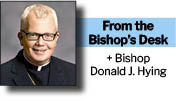
Every close of the year makes us marvel at the rapidity of time. “How can another year be gone?”
I ponder the remarkable number of activities, experiences, and relationships I was privileged to engage in these past 12 months and I find a profound gratitude.
This year of 2023 has certainly been no exception with the launch of our Into the Deep strategic initiative; the Go Make Disciples Live evangelization training; the building of the new Cistercian monastery in Iowa County; the naming by the Holy See of St. Bernard Church in Madison as our new cathedral; the diocesan Camino pilgrimage to Santiago, Spain; our first ever diocesan Eucharistic Congress; and the visit of the relics of St. Jude.
Time as a gift
The gift of time is a mystery and an opportunity.
Marked by clocks, calendars, solar and lunar cycles, and the turn of the seasons, time inexorably marches forward. We cannot speed it up or slow it down.
Oddly, I can remember events that happened 50 years ago as if they were yesterday, and other more recent happenings do not make an impression at all.
Time changes so much. Buildings, employment, friendships, possessions, convictions, and beliefs all change or even disappear with the passage of years.
Things that seemed important 25 years ago may be irrelevant now, and who we have each become certainly is different than who we were decades ago.
Such changes and losses can fill us with a sweet melancholy or a wistful nostalgia as we ponder our past histories, often through the golden filter of memory.
We may be tempted to want to live in the past or to idealize how simple life used to be.
As we face the complexities and difficulties of the present moment, this desire to go backward in time is certainly understandable.
The gift of memory allows us to savor the many gifts that the Lord has poured into our lives over the years, but we cannot afford to simply remain there.
God-given memory
Theologically, could we propose that God gives us memory so that we can abide in the living culture of the Church, reaching back to the riches of the past, so that we can embrace the Faith in the opportunity of the present?
When I ponder the remarkably deep patrimony of Catholicism, I am struck by the spiritual power of the Church’s collective memory.
The Catholic Church remembers the glorious Resurrection of Jesus, the graced moment of Pentecost, the names of all the martyrs, the Nicene Creed, the foundational writings of the Church Fathers, the ineffable experiences of the mystics, the spiritual tomes of every saint, and the daring voyage of every missionary to distant lands.
Every bishop can trace his episcopal lineage back to the Twelve Apostles, and the image and name of every pope who has ever served since St. Peter hangs in the nave of St. Paul Outside the Walls Basilica in Rome.
Common memory builds a living culture. The shared experiences of a family over many years, the rich history of an ancient institution, and the loving bonds of long-time friends create a unifying relationship of beliefs, convictions, identities, and meaning.
Memory humanizes us and leads to self-understanding, illuminating the context of our place in the world.
A significant part of the current spiritual crisis of the West is the collective loss of memory and identity.
Most people in our culture no longer study our history, read our finest literature, know the lives of our heroes, or understand our place in the sweep of global events.
Apply the same dynamic to the common understanding of the Catholic Church. Many Catholics today do not grasp the Biblical worldview, do not know the lives of the greatest saints, have not read a spiritual classic, and do not understand the identity and mission of the Church.
This deficit makes catechesis and formation more essential than ever for us if we seek to build a Catholic culture in our time, which in turn will form missionary disciples.
Building a Catholic culture
To say it again, our collective, living memory and experience of Jesus Christ and the powerful truth of the Gospel creates a Catholic culture, which in turn forms missionary disciples, committed believers who have the confidence and competence to engage others in the love and salvation offered us through the Lord.
This vision animates both our Go Make Disciples evangelizing initiative and our Into the Deep strategic plan.
We continue to pray and strive for successful fruit from these endeavors.
What are some practical ways we can build Catholic culture?
Read Introduction to the Devout Life by St. Francis de Sales or The Story of a Soul by St. Thérèse of Lisieux.
Read and meditate on one of the four Gospels sequentially.
Acquire and display beautiful Catholic art in your home.
Organize rituals of prayer and celebration with your family — the Rosary, the Advent wreath, meal blessings, parental blessing of children, Sacred Heart devotions, and holy water fonts throughout the home.
Study Church history.
Make a pilgrimage to a local shrine.
In these simple ways, we create a Catholic ethos that is both experienced and learned, and our children naturally come to know the Lord and love Him in the great spiritual family of the Church.
As we enter into a new year of grace, I urge everyone to consciously build up a Catholic culture around you, and watch what the Lord will do!
New Year blessings and prayers for all!

